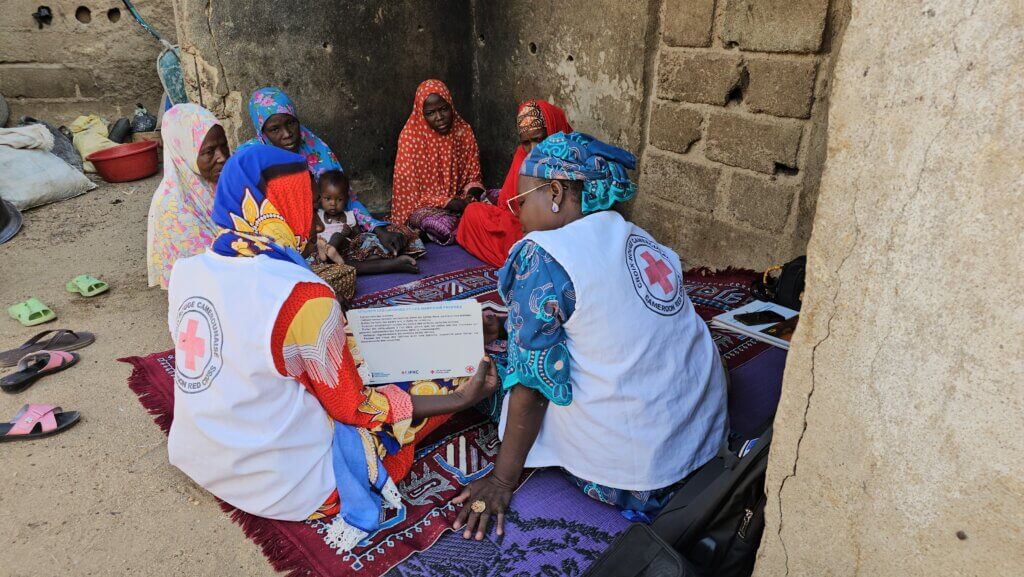What if anticipatory action, an established practice to enhance climate resilience, could help us mitigate the impact of not only meteorological, but also biological hazards?
Forecasting epidemics – the key to preventing health crises
National Red Cross and Red Crescent Societies reduce health threats by improving access to healthcare and increasing community awareness of health risks. In this context, trigger mechanisms are emerging as a new ingredient to improve epidemic preparedness and mitigate health crises before they escalate. The RIPOSTE project, led by the French Red Cross and funded by the French Development Agency (AFD), exemplifies this approach: merging health and disaster risk management techniques, RIPOSTE taps into forecast-based financing strategies for managing epidemic outbreaks. Its work spans four sub-Saharan countries (Cameroon, Chad, the Democratic Republic of Congo, and Guinea), with the Cameroon Red Cross Society championing the development of an Early Action Protocol (EAP) for cholera outbreak preparedness – the first-ever epidemic EAP validated by the International Federation of Red Cross and Red Crescent Societies (IFRC)! The development of this EAP was supported by health specialists from the faculty for public health of the University of Rennes (EHESP), as well as technical experts from the Netherlands Red Cross’ data and digital team, 510.
“We are proud to have contributed, together with the Cameroon Red Cross and 510, to the development of expertise in epidemic preparedness. The experience and knowledge acquired in anticipating cholera epidemics are invaluable not only to the Red Cross Red Crescent Movement, but all humanitarian actors.”
Mathilde Duchemin, Disaster Risk Management Technical Advisor at the French Red Cross
Spotlight on Cameroon’s Cholera EAP
Climate change, through increasingly frequent and severe weather events, influences the spread of cholera, worsening existing vulnerabilities and creating new challenges for public health. RIPOSTE equips humanitarians with the tools needed to anticipate disease outbreaks effectively, using data on previous climate-related events. In Cameroon, these efforts culminated in a trigger model proposing early actions to effectively prevent local cholera outbreaks from occurring, from distributing water purification tablets to disinfecting WASH infrastructure and sensitizing communities. This EAP belongs to the Cameroon Red Cross Society, and was composed in collaboration with the French Red Cross, Cameroon’s Ministry of Health and Ministry of Energy and Water, the National Institute of Statistics, the World Health Organisation (WHO), Médecins Sans Frontières (MSF) and 510.
“Thanks to a trigger system based on climatic and epidemiological data, this Cholera EAP enables rapid intervention to limit the impact of the disease, reduce mortality and avoid the escalation of a health crisis. It represents a proactive response, before an epidemic spreads.”
Cyrille Ewane Ngando, Epidemiologist and Cholera Focal Point at the Cameroon Red Cross
The EAP integrates climate risk data and community-based surveillance into a trigger mechanism, enabling timely health interventions when predefined triggers, such as increased rainfall or community-reported cholera cases, are met. Community findings are sourced by Cameroon Red Cross Society volunteers reporting disease symptoms in their local community to the National Society and Ministry of Health. A data management system (EspoCRM), connecting to a Power BI dashboard for data visualisation, supports the Cameroon Red Cross Society in managing the EAP and monitoring trigger levels. Sending automatic alerts, this low-tech system allows the Cameroon Red Cross Society to monitor epidemics as well as climate and community case triggers in real-time and manage their intervention.

The IFRC’s EAP validation committee has officially approved the cholera EAP for implementation by the Cameroon Red Cross Society, marking a historic milestone as the first-ever validated EAP for epidemics globally. The EAP is now fully owned and operated by the Cameroon Red Cross Society. Its local implementation, in collaboration with national authorities, ensures that the protocol is contextually relevant and actionable.
“Developing this EAP in a participatory manner was an enriching experience, enabling us to learn a great deal about anticipatory planning for epidemics.“
Cyrille Ewane Ngando, Epidemiologist and Cholera Focal Point at the Cameroon Red Cross
Research driving action
To create a data-driven EAP such as this one, informed by cutting-edge scientific research, 510 actively collaborates with students who conduct risk assessments, develop dashboards, and explore entry points for inter-sector collaboration in health management. This ongoing research plays a crucial role, ensuring that future EAPs leverage the best available data while remaining adaptable to advancements in forecasting technology. Ultimately, academic findings enrich protocols with empirical insights, underscoring the value of interdisciplinary collaboration:
“Cholera is a complex disease, impacted by social, environmental, and economic factors. Minimising the impact of cholera by developing early action triggers, before a few cases turn into a large outbreak, requires collaboration across sectors.”
Danielle Rachman, former MSc student at 510
The road ahead
Cameroon’s cholera EAP exemplifies how anticipatory action can transform epidemic preparedness, emphasizing prevention in managing health risks. Its approval sets a precedent for scaling forecast-based action across other regions and illnesses. By integrating weather forecasts with historical data and community insights, all combined in a simple-to-use digital tool, the Cameroon Red Cross Society’s cholera EAP demonstrates that epidemic preparedness is not only possible but essential for building resilient health systems. It symbolises the importance of embracing innovation in humanitarian action and ensuring that the next epidemic is met with preparedness rather than reaction.
DISCLAIMER: Please note that the Arabic, French and Spanish versions of this article were automatically generated using Artificial Intelligence. We cannot guarantee full accuracy of these versions.
We want to hear from you!
Are you interested in hearing more about our EAP work, or implementing a similar solution within your National Society’s context? Please reach out to:
At the Netherlands Red Cross: Service Coordinator, Anticipatory Action: Aklilu Teklesadik ateklesadik@redcross.nl
At the French Red Cross: Technical Disaster Risk Management Advisor: Mathilde Duchemin mathilde.duchemin@croix-rouge.fr